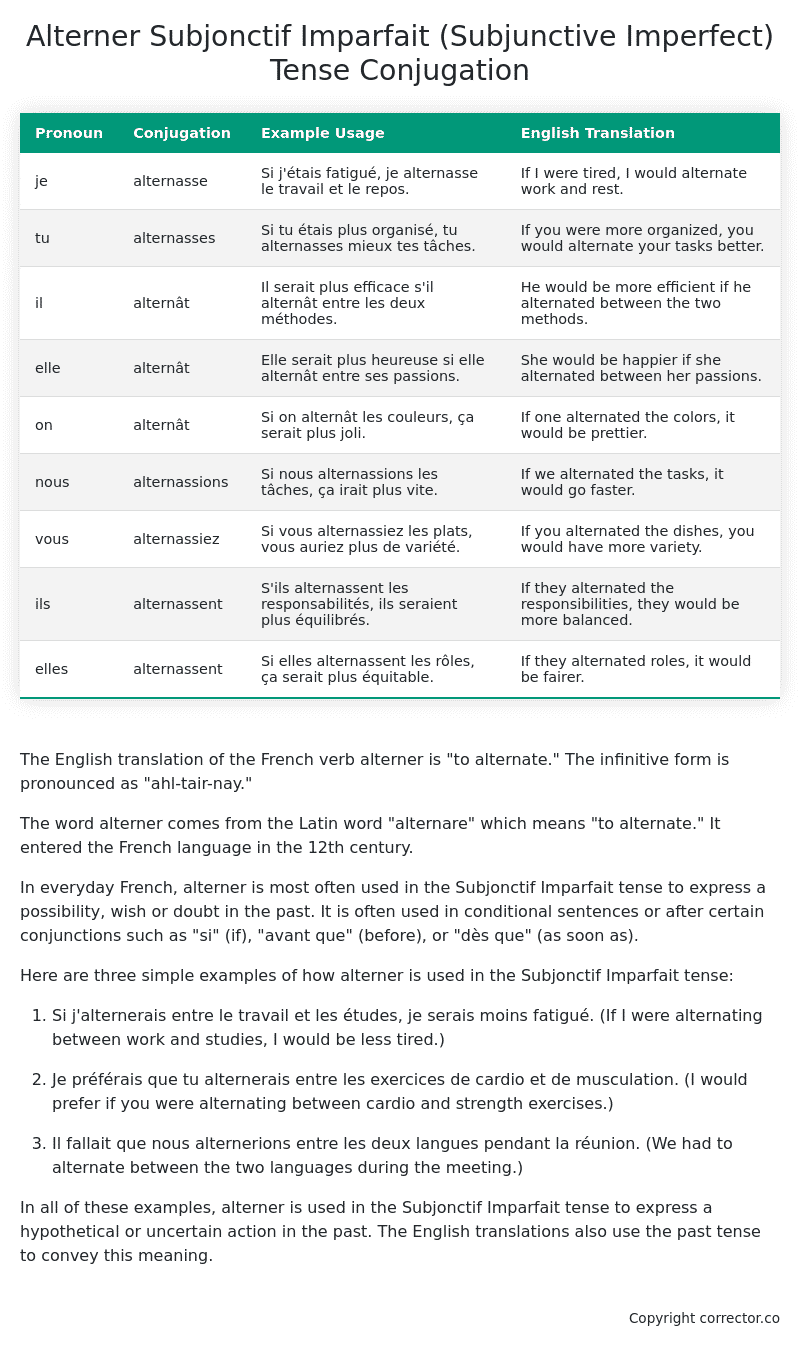Subjonctif Imparfait (Subjunctive Imperfect) Tense Conjugation of the French Verb alterner
Introduction to the verb alterner
The English translation of the French verb alterner is “to alternate.” The infinitive form is pronounced as “ahl-tair-nay.”
The word alterner comes from the Latin word “alternare” which means “to alternate.” It entered the French language in the 12th century.
In everyday French, alterner is most often used in the Subjonctif Imparfait tense to express a possibility, wish or doubt in the past. It is often used in conditional sentences or after certain conjunctions such as “si” (if), “avant que” (before), or “dès que” (as soon as).
Here are three simple examples of how alterner is used in the Subjonctif Imparfait tense:
-
Si j’alternerais entre le travail et les études, je serais moins fatigué. (If I were alternating between work and studies, I would be less tired.)
-
Je préférais que tu alternerais entre les exercices de cardio et de musculation. (I would prefer if you were alternating between cardio and strength exercises.)
-
Il fallait que nous alternerions entre les deux langues pendant la réunion. (We had to alternate between the two languages during the meeting.)
In all of these examples, alterner is used in the Subjonctif Imparfait tense to express a hypothetical or uncertain action in the past. The English translations also use the past tense to convey this meaning.
Table of the Subjonctif Imparfait (Subjunctive Imperfect) Tense Conjugation of alterner
| Pronoun | Conjugation | Example Usage | English Translation |
|---|---|---|---|
| je | alternasse | Si j’étais fatigué, je alternasse le travail et le repos. | If I were tired, I would alternate work and rest. |
| tu | alternasses | Si tu étais plus organisé, tu alternasses mieux tes tâches. | If you were more organized, you would alternate your tasks better. |
| il | alternât | Il serait plus efficace s’il alternât entre les deux méthodes. | He would be more efficient if he alternated between the two methods. |
| elle | alternât | Elle serait plus heureuse si elle alternât entre ses passions. | She would be happier if she alternated between her passions. |
| on | alternât | Si on alternât les couleurs, ça serait plus joli. | If one alternated the colors, it would be prettier. |
| nous | alternassions | Si nous alternassions les tâches, ça irait plus vite. | If we alternated the tasks, it would go faster. |
| vous | alternassiez | Si vous alternassiez les plats, vous auriez plus de variété. | If you alternated the dishes, you would have more variety. |
| ils | alternassent | S’ils alternassent les responsabilités, ils seraient plus équilibrés. | If they alternated the responsibilities, they would be more balanced. |
| elles | alternassent | Si elles alternassent les rôles, ça serait plus équitable. | If they alternated roles, it would be fairer. |
Other Conjugations for Alterner.
Le Present (Present Tense) Conjugation of the French Verb alterner
Imparfait (Imperfect) Tense Conjugation of the French Verb alterner
Passé Simple (Simple Past) Tense Conjugation of the French Verb alterner
Passé Composé (Present Perfect) Tense Conjugation of the French Verb alterner
Futur Simple (Simple Future) Tense Conjugation of the French Verb alterner
Futur Proche (Near Future) Tense Conjugation of the French Verb alterner
Plus-que-parfait (Pluperfect) Tense Conjugation of the French Verb alterner
Passé Antérieur (Past Anterior) Tense Conjugation of the French Verb alterner
Futur Antérieur (Future Anterior) Tense Conjugation of the French Verb alterner
Subjonctif Présent (Subjunctive Present) Tense Conjugation of the French Verb alterner
Subjonctif Passé (Subjunctive Past) Tense Conjugation of the French Verb alterner
Subjonctif Imparfait (Subjunctive Imperfect) Tense Conjugation of the French Verb alterner (this article)
Subjonctif Plus-que-parfait (Subjunctive Pluperfect) Tense Conjugation of the French Verb alterner
Conditionnel Présent (Conditional Present) Tense Conjugation of the French Verb alterner
Conditionnel Passé (Conditional Past) Tense Conjugation of the French Verb alterner
L’impératif Présent (Imperative Present) Tense Conjugation of the French Verb alterner
L’infinitif Présent (Infinitive Present) Tense Conjugation of the French Verb alterner
Struggling with French verbs or the language in general? Why not use our free French Grammar Checker – no registration required!
Get a FREE Download Study Sheet of this Conjugation 🔥
Simply right click the image below, click “save image” and get your free reference for the alterner Subjonctif Imparfait tense conjugation!

Alterner – About the French Subjonctif Imparfait (Subjunctive Imperfect) Tense
Formation
Common Everyday Usage Patterns
Interactions with Other Tenses
Subjonctif Présent
Indicatif Passé Composé
Conditional
Conditional Perfect
Summary
I hope you enjoyed this article on the verb alterner. Still in a learning mood? Check out another TOTALLY random French verb conjugation!


